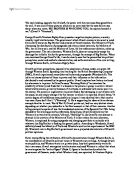The imposing regime in ‘1994’ also gives rise to disturbing attitudes in morality under totalitarian control when the Party can easily ‘Vaporise’ citizens from existence, but not before undergoing rigorous physical and emotional torture in Room 101. Winston feels little to no remorse at the thought of smashing Julia’s ‘skull in with a cobblestone’ when he assumes she is a member of the spies and sees him leaving the antiques shop in the proles area of town. So also does he regret not pushing his then current wife, Katherine, off of a precipice to end their matrimonial contract. The totalitarian regime also has a prominent impact on social identity with the constant erasure and creation of history, as Bertrand Russell said ‘An important condition of identity, both personal and societal is the ability to connect past and present. We have no concept of our past or of ourselves unless we are prepared to accord knowledge to accounts of how we were’.
Orwell’s ‘1984’ outlines the visualisation of a totalitarian future by drawing upon several elements of our present and past. The choice of a Jewish name, Emmanuel Goldstein, for the main enemy of Oceania (the America’s, UK, and Australasia) draws attention to previous anti-Semitic totalitarian regimes of our century i.e. The Nazis and the Communists who affiliated the country’s problems with the existence of Jewish citizens. Emanuel Goldstein could also be symbolised as Trotsky, a leader of the Russian Revolution, who was later declared as an enemy.
In addition, many of the particulars of the Oceanic system (such as the Three-Year Plans and the forced-labour camps) appear to be thinly veiled allusions to aspects of Stalin's rule. It can even be conjectured that "Big Brother," with his dark, heavy moustache, is actually Stalin. Stalin’s ‘Cult of Personality’ could also be attributed to Big Brother’s arbitration of his apparent perfection, with similar statues, and hero worship.
The totalitarian regime described in ‘1984’ is consistent with both political spectrums in the past, but also in the present Chinese totalitarian regime. The infringement upon human rights with the ‘one child rule’ and extensive media propaganda and control is still active and perhaps increasing with regards to the internet and surveillance. IP-blocking and content-filtration firewalls are at work, dedicated to blocking Chinese internet users from reaching websites beyond the reach of censorship that contain news or any other "pernicious information" such as politics, human rights and minority issues. Some commentators have dubbed it "The Great Firewall of China’. Chinese security agents also regularly flood overseas Chinese language chat rooms with posts aimed at sabotaging the solidarity of the Chinese political exile community and making personal attacks on public exile figures. According to the Human Rights Watch, as of January 2001, sending 'secret' or 'reactionary' materials over the Internet became a capital crime. In April 2001, the Ministry of Public Security formally proposed an ambitious national project, known as the "Gold Shield" project with the plan to build a nationwide digital surveillance network, linking national, regional and local security agencies with a web of surveillance designed to increase police efficiency. The State Planning Commission approved the proposal last November and the project is well on its way to implementation.
In short, circumstantial evidence in China highlights the ease with which totalitarian regimes can be implemented outside of fiction with the development of modern technology particularly in surveillance and dissemination of information. In western societies ‘Big Brother’ doesn't make himself so obvious; we are not told today where we are watched, yet still we can be watched in 3D with cameras smaller than the head of a pin. And we can be heard by invisible lasers pointed at a solid from a mile or more away. We can be tracked from space with satellites with a reported resolution of less than one foot and telecommunication companies can detect our whereabouts from mobile phones. Who can verify what our 'free press' reports? Who checks and rechecks the information the media reports to us? What plausible lies are we constantly fed until they become fact, and get changed slowly a bit more? Supposedly there is a law that states subliminal advertising may not be used, but how is this checked, and to whom does it apply? From reading George Orwell’s ‘1984’ one can become quite dubious and fearful of the technological age and the possibility of totalitarian control even with the presence of Human Rights Committees and the like. Is ‘Big Brother watching you’ now?







